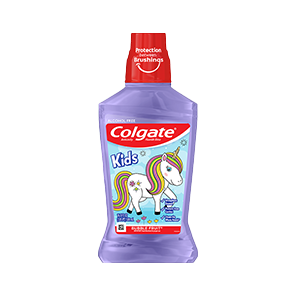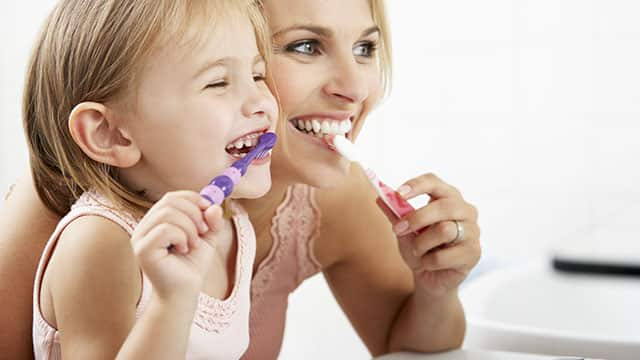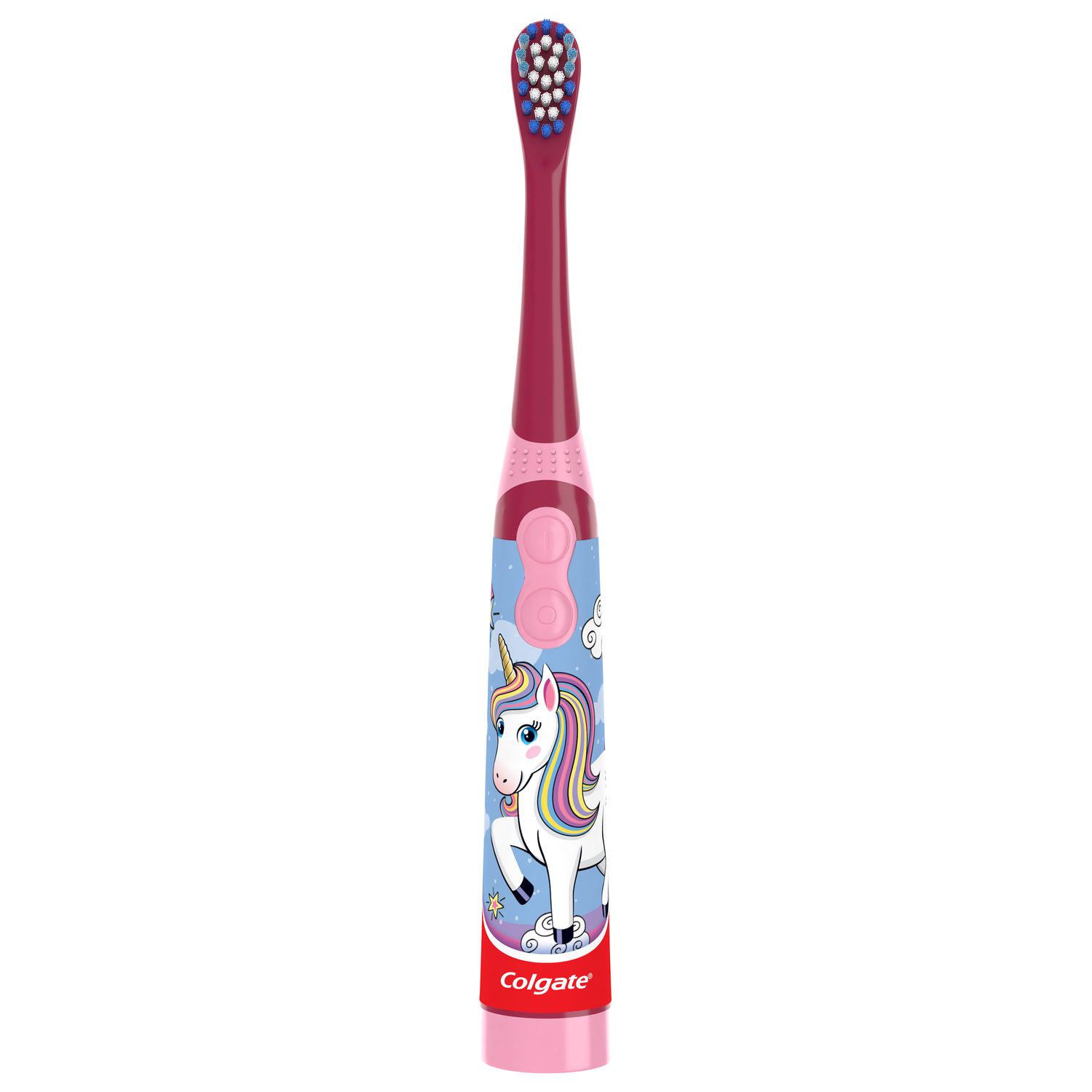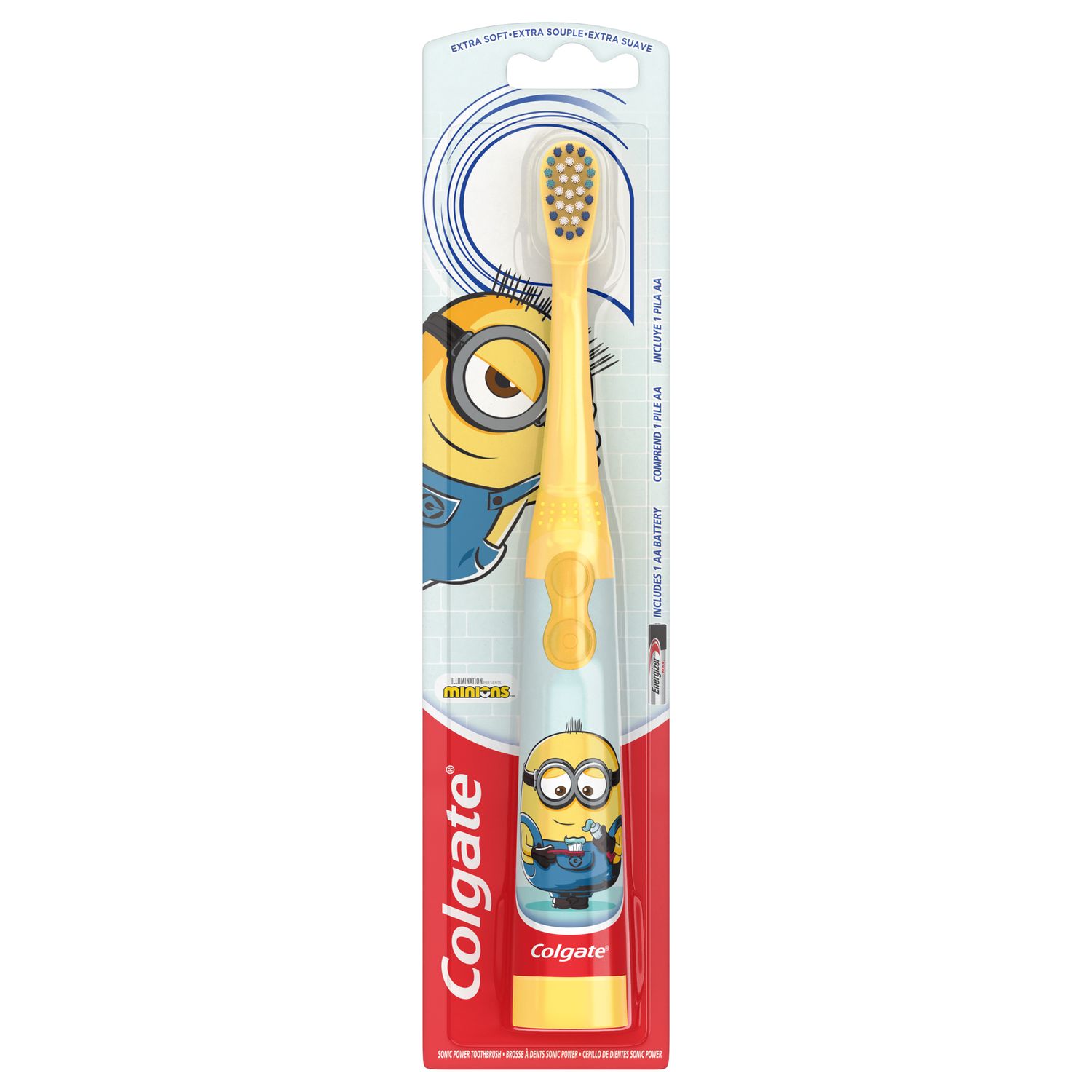
Unicorn Mouthwash
Brushing is better with friends. Colgate® Kids Unicorn Mouthwash protects from cavities and strengthens enamel.

Are Your Kids Ready?
One of the first considerations in using mouthwash for kids is their age. According to the American Dental Association (ADA), children under six should not use mouthwash. That means babies and toddlers should not use mouthwash, either, as children under six may not have fully developed their swallowing reflexes and could swallow the mouthwash. This can lead to side effects like vomiting, intoxication, and nausea.
Further, while small amounts of fluoride help keep your child’s teeth healthy and cavity-free, large amounts can lead to enamel discoloration, also known as fluorosis. If your child ingests mouthwash containing fluoride, fluorosis could manifest as white streaks on the teeth. According to the ADA, children under the age of eight are at risk for developing this condition when their teeth are still forming beneath their gums. But once the teeth emerge, they’re no longer at risk. Luckily, fluorosis isn’t a disease and won’t affect your child’s health. Instead, it's a cosmetic condition. To prevent it, make sure your child doesn't use mouthwash too soon or swallow their fluoride toothpaste.
Benefits of Mouthwash
If your child is over the age of six and you want to add mouthwash into their oral care routine safely, they’re in for some valuable benefits.
- Fresh breath: Mouthwash can help give kids fresher breath and boost the effects of flossing and brushing once and twice a day, respectively.
- Protection: Mouthwashes that contain fluoride also provide an extra dose of cavity protection for kids over the age of six.
- Extra cleaning: If your child wears braces, mouthwash can loosen bits of food that often get stuck in the brackets, ensuring a more thorough cleaning job.
- Helps with brushing: Using a mouthwash can also help kids who haven't yet mastered brushing or flossing, allowing them to reach areas they cannot.
Using Mouthwash
Now that you know the benefits and risks of mouthwash, here are some tips on adding it to your child’s oral care routine.
- Choose an alcohol-free product: Before your child starts using mouthwash, be discerning with what type you buy. Some types of adult mouthwashes contain alcohol, which kills the invasive bacteria that can fester inside the mouth and along the gumline. This additive is safe for adults but not so much for children. Kids shouldn't use alcohol mouthwash because, like fluoride, swallowing small amounts of alcohol is counterproductive to a growing body.
- Hold on to the mouthwash yourself: You should always store mouthwash out of the reach of young children. Because it's both brightly colored and well-flavored, they may think it's a tasty beverage. Therefore, store your mouthwash on a high shelf or in a locking cabinet until your kids are old enough to understand how to use mouthwash safely.
- Make sure to supervise: For children between the ages of 6 and 12, supervision and education are essential—not only to ensure they’re not swallowing it but also to make sure they’re using it correctly. It can be tricky for young kids to get used to swishing the liquid rather than swallowing it like a beverage. One way to test your child and see if they are ready to use a mouthwash is to have them take a sip of water, swish it around their mouth and then spit it out into the sink. If kids can handle rinsing with water, they can most likely handle mouthwash.
- Try a timer game: If you’re looking to add some fun to this new practice, try making a game out of using it by setting a stopwatch, timing them for about a minute, then yelling "spit!" or "go!" when it's time to spit it out. Supervising your child in the early stages of using a mouthwash will let you make sure that they are brushing and flossing before using the rinse.
If you’re unsure whether your child should use a mouthwash, talk to their dental professional. They might decide that mouthwash will indeed benefit your kid's teeth or determine that your child’s teeth are healthy and strong without it. If you decide to let your child use mouthwash, choosing a product made for kids will help get them excited about another step in their oral care routine and help them form healthy, lasting habits.
This article is intended to promote understanding of and knowledge about general oral health topics. It is not intended to be a substitute for professional advice, diagnosis or treatment. Always seek the advice of your dentist or other qualified healthcare provider with any questions you may have regarding a medical condition or treatment.
ORAL HEALTH QUIZ
What's behind your smile?
Take our Oral Health assessment to get the most from your oral care routine
ORAL HEALTH QUIZ
What's behind your smile?
Take our Oral Health assessment to get the most from your oral care routine















